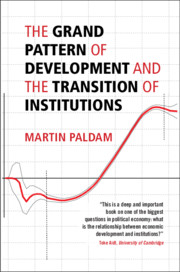Book contents
- The Grand Pattern of Development and the Transition of Institutions
- The Grand Pattern of Development and the Transition of Institutions
- Copyright page
- Contents
- Figures
- Tables
- Preface
- Part I Main Ideas
- Part II The Transitions of Institutions
- Contents
- Part IIA The Democratic Transition
- Part IIB The Transition of the Economic System
- Part IIC The Transitions in Traditions and Beliefs
- Contents
- 10 The Transition of Corruption
- 11 The Religious Transition
- Part III The Grand Transition
- References
- Index
10 - The Transition of Corruption
from Part IIC - The Transitions in Traditions and Beliefs
Published online by Cambridge University Press: 07 August 2021
- The Grand Pattern of Development and the Transition of Institutions
- The Grand Pattern of Development and the Transition of Institutions
- Copyright page
- Contents
- Figures
- Tables
- Preface
- Part I Main Ideas
- Part II The Transitions of Institutions
- Contents
- Part IIA The Democratic Transition
- Part IIB The Transition of the Economic System
- Part IIC The Transitions in Traditions and Beliefs
- Contents
- 10 The Transition of Corruption
- 11 The Religious Transition
- Part III The Grand Transition
- References
- Index
Summary
The definition, measurement, and scale for the Transparency International corruption T-index are discussed. It increases when corruption falls. A large cross-country sample exists, but long time-series are based on anecdotes. They seem to confirm equivalence. The theories connecting development and corruption are surveyed. There are the demand theory seeing honesty as an intangible good, the transaction theory, and the sand vs. grease theories. The T-index has a beautiful transition curve that is very robust. The causality tests show that the main direction of causality is from income to corruption, but there is some simultaneity. While the T-variable is positively correlated to the levels of income, democracy, and economic freedom, it is negatively correlated to the first difference of these development variables. It is also a problem that the four variables are strongly confluent, as they all have transitions, but the transition of corruption is later than the transitions to democracy and a modern economic system. A set of examples show that institutional uncertainty gives corruption.
Keywords
- Type
- Chapter
- Information
- Publisher: Cambridge University PressPrint publication year: 2021

